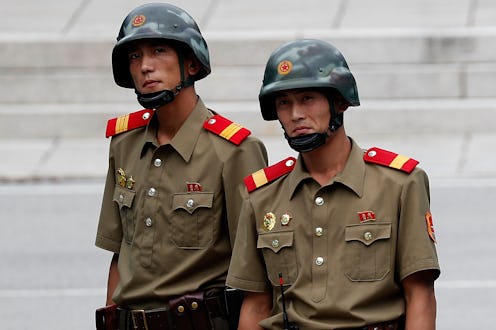News
North Korea Says It Won't Be Firing Missiles At Guam After All

After several days of escalating warnings between North Korean leader Kim Jong-un and U.S. president Donald Trump, it seems North Korea has decided not to attack Guam on Tuesday as previously threatened. The decision came Monday, after the North Korean leader reportedly reviewed the military plans for an attack on the small Pacific island, according to North Korean state media, NPR reported. Kim evidently came to the conclusion that waiting to see what actions the U.S. will take is the best course.
"He said that the U.S. imperialists caught the noose around their necks due to their reckless military confrontation racket, adding that they would watch a little more the foolish and stupid conduct of the Yankees," said the report from the country's state media, the Korean Central News Agency.
Specifically, Kim combatively warned:
If the Yankees persist in their extremely dangerous reckless actions on the Korean Peninsula and its vicinity ... [North Korea's military] will wring the windpipes ... [and] point daggers at their necks.
Though the tension between the U.S. and North Korean has been high long before President Trump's inauguration, Trump's rhetoric is different from that of his predecessors in that it mirrors Kim's antagonism and is equally as graphic.
"North Korea best not make any more threats to the United States," Trump said last Tuesday while speaking to reporters at his golf club in Bedminster, New Jersey. "They will be met with fire and the fury like the world has never seen."
Trump's warning came after North Korea tested a ballistic missile with the potential to hit California, according to experts.
After Trump's "fire and fury" comment, General Kim Rak Gyom, who leads North Korea's strategic forces, dismissed the president's threats and went on to issue the threat of firing missiles into waters near the U.S. territory Guam in a strike that would "envelop" the island in fire. Of Trump he said, "Sound dialogue is not possible with such a guy bereft of reason and only absolute force can work on him."
Refusing to give a toned down response, Trump reacted last Thursday to criticism of his rhetoric by suggesting he hadn't gone far enough.
Frankly, the people who were questioning that statement, was it too tough? Maybe it wasn't tough enough. They've been doing this to our country for a long time, for many years, and it's about time that somebody stuck up for the people of this country and for the people of other countries. So if anything, maybe that statement wasn't tough enough.
Former President Barack Obama approached the contentious relationship with North Korea with a policy of "strategic patience," overseen by Hillary Clinton as Secretary of State; the policy favored diplomacy and the implementation of sanctions. President Trump slammed the strategic patience policy in June, declaring it to have "failed" and announcing it to be "over."
According to The New York Times, Trump held a 30-minute phone call with Japanese Prime Minister Shinzō Abe on Tuesday to discuss the conflict with North Korea. Abe said they "frankly exchanged opinions on the current North Korean situation" and added that he was appreciative of Trump's "commitment to the safety of its allies."